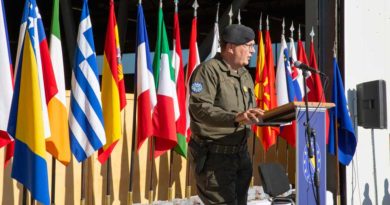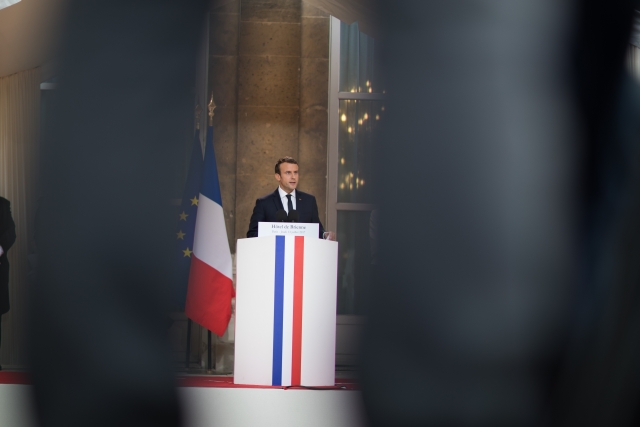How the Council conclusions on Georgia were drafted
(B2) The conclusions of the European Council, specially convened on September 1, are a model of haute couture. A fairly firm statement - despite appearances - but not presumptuous for the Russians. Taking immediate measures, however, it preserves the future. All in barely three hours of debate. For a highly difficult subject, it's not bad... We can no longer speak of a "division" of Europeans, nor of their "weakness". These conclusions are, in fact, of a fairly strong level compared to what could be undertaken.

It must be said that the preparing for this summit was particularly intensive. The various paragraphs of the conclusions have been tested, examined and rewritten with certain "sensitive States" (United Kingdom, Poland, Baltic States, Italians, Germans, etc.), explains a French diplomat. The telephone rang a lot in the capitals... The foreign ministers of seven Eastern countries had thus agreed to meet for a conference call of the group of "friends of Georgia" (the three Baltics - Estonia , Lithuania, Latvia -, Poland, Hungary, Czech Republic, Slovenia) in order to tune their violins. When Nicolas Sarkozy arrives at the European Council, he therefore has a text of conclusions drawn to the line, which gives everyone.
The only change that will be made will be the addition, at the end of the text, of the suspension of meetings of the EU-Russia partnership "until the military withdrawal is not effective" and the dispatch to Moscow (and Tbilisi), on September 8, of the troika European Union (Nicolas Sarkozy for France and EU Presidency, José-Manuel Barroso for the European Commission, Javier Solana, EU High Representative for Foreign and Defense Policy). An addition that is not due to chance, the paragraph was planned at the start - Sarkozy read it in the preamble to the Council - but it was deemed appropriate to add it, on the fly. "That's negotiation" says a diplomat. "It is necessary that the final text is not quite the text presented".
What is not specified is that this meeting has received the consent of the Russians who have promised the French to withdraw by the end of the week. Sarkozy had a telephone conversation with Medvedev the day before the summit. Nb: by the way, Nicolas Sarkozy received a "mandate"of his peers for"continue discussions with a view to a full six-point agreement". Which was also not provided for in the original text.
Examples of this high fashion.
To satisfy on the one hand the Germans, Italians, Greeks (*) or Spaniards who do not wish to offend the Russians very much, we will speak of the "open conflict that broke out in Georgia" and of "disproportionate reaction" of the Russians and not of "disproportionate action". It is understood that they only reacted (to an attack by the Georgians). But all that is understood. Nothing is mentioned about what preceded the "reaction" (§1).
To please the Baltics, Poles and Britons, we remind you that "such military actions are not a solution and are not acceptable" (§1) and that the principles of international law, in particular "theterritorial integrity" must be respected. And, above all, we ask the "military forces which have not yet withdrawn to the lines prior to the outbreak of hostilities (to) do so without delay". This mainly concerns the Russians but it is not mentioned (§4).
The point of balance is reached with this cryptic statement that "each state in Europe has the right to freely determine its foreign policy and its alliances" (Imposed of participation in NATO). But "it is also legitimate for everyone's security interests to be taken into account" (§3).
The "hard" points of the text

La condemnation of the recognition of Abkhazia and South Ossetia is strong. Not only do the 27 consider that "this decision is unacceptable", but they also call on the other States "not to recognize these proclaimed independences". The European Council also asks the Commission "to examine the concrete consequences to be drawn from it" (§2).
An ultimatum: military withdrawal. The 27 matched their request for respect for theceasefire agreement with a very clear ultimatum: "As long as the withdrawal of troops to their positions prior to August 7 has not been carried out, the meetings for the negotiation of the partnership agreement (EU -
Russia) are postponed(§11). The troika mission on September 8, the president said, will aim to verify the withdrawal.”Until then all meetings are postponed specified Nicolas Sarkozy during his press conference. It should be specified that this postponement, this suspension concerns only the negotiation of the partnership agreement and not all the other meetings. And that the next meeting was scheduled... September 16th. So the suspension is only virtual. Nicolas Sarkozy and the 26 other Heads of State and Government have only to cross their fingers to hope that by then the Russians will keep their promise and withdraw to the "previous lines" (i.e. say in South Ossetia and Abkhazia).
A Evaluation possible measures. Moreover, the 27 asked the Commission and the Council, the two executive bodies of the EU, "to examine carefully and in depth the situation and the different dimensions of the EU-Russia relationship" (§11). A report on this assessment will be made before the EU-Russia summit on November 14, which is the first real official meeting with the Russians since the start of the crisis.
We can therefore speak rather than measures of "freezing relations", as some have related, of "putting under surveillance" as mentioned by a French diplomat. It's more accurate.
The positive approach

After recalling the facts and condemning them, the 27 preferred to look at the situation in a positive light:
1) Tie Georgia more closely to Europe (§6): reconstruction aid, with the convening of an international conference, the preparation of free trade or visa facilitation agreements (it was indeed quite extraordinary - not to say abnormal - that the Russians as well as Ossetians who had Russian passports could benefit from visa facilitation agreements and not Georgians who did not have such an agreement). It was a request from Poland and several Eastern European countries who have, in the background, the idea of strengthening relations with Ukraine, which is more strategic for them.
2) Engage in a "eastern partnership" with Eastern and Black Sea countries (§7). A proposal that has already been put on the table in recent months but that the 27 now want to put at the top of the priorities. The Commission is due to present a partnership project in December and the European Council to adopt it next March (under the Czech Presidency).
3) Strengthen the European presence in the region, by a series of crisis measures (§5 and §8): appointment of a special representative "conflict in Georgia" (§8) and dispatch of a civil defense mission.
4) Diversify your energy sources (to make themselves less dependent on the Russians). It's necessary "stepping up European efforts on security of energy supply" says the European Council, which asks the Commission and the 27 to examine "the initiatives to be taken (...) with regard to the diversification of energy sources and supply routes" (§9). A request particularly supported by the British.
5) Reasoning Russia. It is a real call that is launched to him. "There is no desirable alternative to a strong relationship, based on cooperation, trust and dialogue, on respect for the rule of law and the principles recognized by the Charter of the United Nations and by the OSCE. " (§10)
Anecdote: at the end of the Council, the Russian ambassador to the EU gave many comments to all the journalists who wanted it. If his statement sounded a little strong: "We are also going to review all our methods of cooperation with the European Union" he said in particular. But it was hard to believe what he was saying. And he himself seemed to have trouble believing it. The relief seemed quite visible from the overall moderate tone of the 27. avoided raising his voice too much.
(NGV)
Photo credits: Council of the European Union: 1- Sarkozy - Merkel (Germany) - Brown (United Kingdom; 2-Kouchner - Sarkozy - Pöttering (European Parliament); 3- Berlusconi (Italy) - Jansa
(Slovenia)- Ancip (Estonia)


